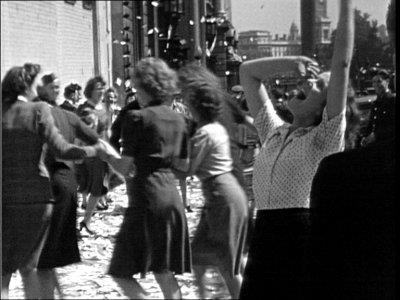Dir: Ken Loach. UK. 2013. 94mins

Ken Loach applies his unwavering and astute eye to the British Welfare State, created in a wave of post-War optimism and clear-eyed determination, and finds that the ‘spirit’ that saw many industries and services nationalised and run in the service of the populace - and a National Health Service created too offer free health care to all - have badly diminished and are perhaps in terminal decline.
Loach’s point is that the euphoria of 1945 needs to be revisited and remembered.
The veteran film-maker doesn’t offer a direct documentary maker’s voice to The Spirit Of ’45, instead he presents the personalities and voices of a series of people who saw the initial benefit and impact of the new Britain and have grown old alongside its decline, as well as academic commentators who offer at times a pragmatic view of the period.
The film opens in black-and-white and the closing years of World War II. Though Britain was united in its battles and pulled together to not only fight but also to keep industry ticking over, there were also bitter memories of the inter-war years. There was a sense of empowerment from the collective struggle within the country, and when elections came the Labour Party was elected comprehensively on a mandate to reconstruct the country based on new housing, a health service and transport systems that worked for all and not just the privileged few.
From the post-War wide-eyed enthusiasm through to the dismantling of state run industries during the Thatcher period, the film tracks the nationalisation of industry and creation of housing, and of the radical development of a National Health Service. Commentators include pioneering GP Dr Julian Hart; Welsh miner Dai Walters (one of Dr Hart’s patients); Liverpool dockworker John Farrell; Manchester nurses Karen Reissmann, Dena Murphy and Margaret Battin, who were there on July 5, 1948, when Nye Bevan handed over their hospital keys to the newly formed NHS, and railwayman Ray Thorne, as well as a series of academics and activists, including James Medway and John Rees.
Some of the stories of the poverty endured and the changes made are moving and compulsive, and archive footage of politicians at the times and the practical changes being made fascinating. The film is at its best detailing the very real changes and the political drive of the post War period, though tends to rush through the 1960s so it can plonk the blame for the dismantling of the system at the hands of Margaret Thatcher and her Tory government. One commentator raises the point that mistakes were made in the establishment of the ‘New Socialism’, but this is never really explored or even recognised by other commentators…Loach’s point is that the euphoria of 1945 (exemplified by his use of colour archive footage of celebrations and optimism at the end of the War) needs to be revisited and remembered.
Production companies; Sixteen Films, Fly Film
International sales: Wild Bunch, www.wildbunch.biz
Producers: Rebecca O’Brien, Kate Ogborn, Lisa Marie Russo
Cinematography: Stephen Standen
Editor: Jonathan Morris
Music: George Fenton




















